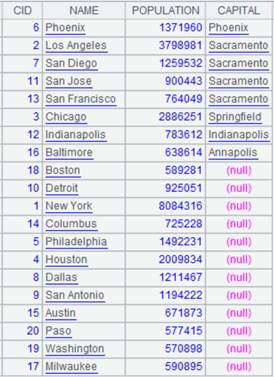s. regex()
Description:
Match a string with the regular expression.
Syntax:
s.regex(rs,rpls)
Note:
The function matches string s with the regular expression rs, replaces the first matched character with string rpls, and returns the string after replacement.
It returns a sequence consisting of matching strings when parameter rpls is absent, and null when the matching fails.
Parameter:
|
s |
A string. |
|
rs |
Regular expression. |
|
rpls |
A string. |
Option:
|
@c |
Case insensitive. |
|
@u |
Use Unicode to match. |
|
@a |
Replace all matching characters. |
|
@w |
Find whether the regular expression matches with the whole string. |
|
@p |
Parse the result numeric string into a number. |
Return value:
Sequence/String/Numeric value
Example:
|
|
A |
|
|
1 |
4,23,a,test |
|
|
2 |
a,D |
|
|
3 |
W,F |
|
|
4 |
=A1.regex("(\\d),([0-9]*),([a-z]),([a-z]*)") |
|
|
5 |
=A2.regex@c("([a-z]),([a-z])") |
With @c option, it is case insensitive. |
|
6 |
=A2.regex("([a-z]),([a-z])") |
Return null because they don’t match. |
|
7 |
=A3.regex@u("(\\u0057),(\\u0046)") |
[W,F]; Use unicode to match. |
|
8 |
=A1.regex("([0-9])","hello") |
hello,23,a,test. |
|
9 |
=A1.regex@a("([0-9])","hello") |
hello,hellohello,a,test. |
|
10 |
="123abc".regex("[0-9]a") |
123abc. |
|
11 |
="123abc".regex@w("[0-9]a") |
Use @w option to find whether the whole string matches and return null. |
|
12 |
="9,20,hello,6.269".regex("([0-9.]+)") |
Return a sequence of strings:
|
|
13 |
="9,20,hello,6.269".regex@p("([0-9.]+)") |
Parse result numeric strings into numeric values:
|
Related function:




